|
|
| |
| EVENTS |
|
|
> Mathematical precision in compliance recommended: ICCI; Standing Committee on Finance and Revenue must adopt a holistic approach to amend AMLO 2007: Syed Naveed Qamar
Briefing Sessions on Money Laundering and Pakistan for Parliamentarians and Businesspersons |
| |
|
Briefing Session
January 22, 2009
ICCI, Islamabad
|
|
| |
Islamabad, January 22: PILDAT organised two exclusive Briefing Sessions for Businesspersons and members of the Parliament on Money Laundering and Pakistan on January 21 and 22 respectively in Islamabad. |
|
| |
Money Laundering and its linkage to terrorist financing have become a matter of growing concern especially after 9/11 and the ensuing War against Terrorism; not only these crimes are fairly new to the scholars and adjudicators of international law, but their trans-national character and a multitude of creative methods involved, add to the challenges that come in way of curbing them effectively. Thus, to understand the need to comply by internationally set recommendations, prescribed by the Financial Action Task Force (FATF); for creating a transnational regime against money launderers; as well as for the benefit of our economy and good governance, PILDAT has held briefings on the subject for a cross section of stakeholders. These include Senior Government Officials; members of the Parliament; Media persons and Businesspersons. Through these briefings, PILDAT aims to facilitate the stakeholders in founding a well discussed and thoughtfully structured AML Legislation for Pakistan.
|
|
| |
First briefing session, for Businesspersons, was held on Wednesday, January 21, 2009 at Islamabad Chamber of Commerce Auditorium. The Briefing was widely attended by industrialists and businessmen ranging from IT (Information Technology) to mining to automobiles, etc. To brief the businesspersons on the meaning and purpose of having an effective and strong Anti-Money Laundering Law and its repercussions on the financial and commercial interests, a panel of experts comprising: Mr. Azhar Hussain Shah, Operations Chief, Regional Headquarters, National Bank of Pakistan and Mr. Ahmer Bilal Soofi, President, Research Society for International Law, Pakistan Office and Senior Advocate, Supreme Court, addressed the participants. Muhammad Ishtiaq Qureshi, Vice President, Islamabad Chamber of Commerce and Industry chaired the briefing session while Mr. Ahmed Bilal Mehboob, Executive Director, PILDAT, introduced the subject and moderated the session. |
|
| |
PILDAT especially prepared three publications on the subject: Legislative Brief on Anti Money Laundering Bill; Briefing Paper on Pakistan�s Anti-Money Laundering Legislation and a Comparative Study on Anti-Money Laundering Legislations in the Region, which were circulated among the participants during both the briefing sessions. |
|
| |
The second briefing session was for members of the Parliament and was held on Thursday, January 22, 2009. The speakers for this briefing included Mr. Ahmer Bilal Soofi and Mr. Haroon Sharif, Senior Advisor, UK�s Department for International Development and Former Executive Director, Securities and Exchange Commission of Pakistan. Syed Naveed Qamar, Federal Minister for Privatizations chaired the event; while the participants included members of Standing Committees and ministries of: Economic Affairs and Statistics; Finance and Revenue; Foreign Affairs; Interior; Law, Justice and Human Rights; Narcotics Control; Planning and Development; and interested members of the parliament. |
|
| |
During the briefing experts explained the concept of money laundering; its trans-national nature and its effects on the governance and economy of a country; the need to comply by the international recommendations to our benefits; and the extent of the compliance. |
|
| |
Moreover, the experts sensitised the mentioned stakeholders of the damages incurred by sustaining an economy that is permissive of money laundering, as opposed to the benefits of having an efficient anti-money laundering legislation that is not only beneficial for the country but also fulfills our global obligation of collectively stifling money launderer�s networks to curtail illegitimate leakages in the global economy and subsequently, hold back transnational mafias from booming. An effective check against money laundering would also set off formalisation of our financial system, they said, and proper financial documentation will in turn enhance transparency leading to better resource allocation and accuracy in national financial calculations. |
|
| |
Briefing Sessions for Businesspersons
Businesspersons agreed to assume a proactive role in the amendments of AMLO 2007 (Anti-Money Laundering Ordinance 2007) by urging the legislators to amend the law with �mathematical precision� to avoid �over compliance� to the FATF (Financial Action Task Force) recommendations. Speaking to the participants, the experts pointed out that businesspersons would soon find themselves in unnecessary appendages if they continue to remain indifferent toward AMLO 2007, which is in the process of amendment at this stage. Speaking on the issue, Mr. Ahmer Bilal Soofi, said that holding movable and immovable property is a fundamental right of every businessperson and no government can arbitrarily temper with this right; he said that our government has been in a practice of drafting overly ambitious legislations, to the disadvantage of the citizens in the past, in an attempt to appease the international community. However, he also stressed that a country surrenders part of its sovereignty by ratifying an international convention and thus has to comply with the provisions of the same in order manifest its global responsibility on a matter of transnational concern and cohesiveness to the international community. He informed the participants that the FATF (Financial Action Task Force�s) Recommendations on Money Laundering and Terrorist Financing prescribed by the G-8 have a binding effect over Pakistan by virtue of chapter 7 of the UN charter. He also informed the business community that international organisations, such as European Union, extend assistance and cooperation to developing countries keeping in view the evaluation reports prepared by regional monitors of the FATF such as Asia Pacific Group on Money Laundering (APG-ML) of which Pakistan is a member. The APG, Mr. Ahmed Bilal Mehboob of PILDAT told the businesspersons, is a monitoring and reporting organ that visits member countries on annual basis to evaluate their legislation and its implementation as per FATF recommendations. He informed that a team of APG evaluation is scheduled to visit Pakistan this month, quoting Mr. Azhar Iqbal Kureshi, Director General, Financial Monitoring Unit, who reported this development during a PILDAT Briefing Session on the same subject organised exclusively for Senior Government Officials of Pakistan last month.
Moreover, Mr. Ahmer Bilal Soofi recommended setting up a Council of Arbitration, comprising corporate lawyers and experts (having peculiar technical expertise on businesses such as IT, mining, etc) nominated by members of the ICCI. He emphasized on ICCI�s territorial advantage of operating in the Federal Capital and urged them to take the lead in following the international tradition initiated by the International Chamber of Commerce or the London Chamber of Commerce who founded their Arbitration Councils to work as specialised, alternative, corporate-dispute resolution bodies. He also said that ICCI may organise awareness and capacity-building programs for the lawyers to acquaint them of the peculiarities of various businesses. Mr. A.Q. Khan, a member ICCI suggested the usefulness of Senior Commercial Counselors in the cities of industrial concentration and their understanding of the plight of the businesspersons in their region, in this regard.
Mr. Ahmer Bilal Soofi urged the business community to present their case before the government by stressing on transparency of the business community, as evident from high inflow of the remittances, and asked them to insist on relenting unnecessary legal inhibitions coming in way of Pakistan�s commercial interests.
Answering a question, Mr. Ahmer Bilal Soofi commented that due to the lack of capacity and awareness, the government had drafted �bad� legislations in the past, a practice PILDAT is trying to curtail by organising capacity building workshops and briefings for both the legislators and policy makers across the country. He also said that the current AML Ordinance 2007 law is ambiguous over whether a person can be tried for the crime of money laundering alone or should its link with the predicate offence be established beforehand and tried together with dual charge.
Mr. Azhar Hussain Shah briefed the participants over the meaning of money laundering, its transnational nature and various procedures of money laundering prevalent in Pakistan. He stressed on the �cyclic effect� of money laundering and identified Hawala, Hundi, bearer investment schemes, investment and speculation in real estate, over and under invoicing on import and export, expenditure on luxury items having susceptible connection to money laundering in Pakistan. However, informal banking systems like Hawala and Hundi, Mr. Ahmer Bilal Soofi stressed, are not prohibited by the FATF recommendations instead they are merely required to be �regularised� by issuance of licenses so that they include the country�s financial record for the process of �money trailing� that is required to track back money in case of suspicious transaction. Likewise, he said that no transaction of transnational nature can be tried for money laundering unless its link with predicate crime is established. Similarly, not all fiscal crimes such as tax evasion can be tried under AMLO 2007 as the mentioned crime is not part of the predicate list although it may be tried under some other law.
In the end Mr. Ishtiaq Qureshi commended the efforts of PILDAT�s initiative on such critical issue and elucidated upon the repercussions of money laundering through informal banking channels, on the financial sector and the economy of the country. |
|
| |
Briefing Session for members of the Parliament
During a briefing session held exclusively for members of the Parliament it was agreed that the financial system should be regularized by giving cheaper and effective choices to common man as an option against Hawala and Hundi. Mr. Haroon Sharif pointed out the need for �beyond legislative prescription� required to change a market trend that favours Hawala because of its cheap and efficient money transfer facility at the doorstep of even the remotest of the rural areas. Formal banking stretches to only 10 percent of the total financial sector, experts informed, and further stringent regularisation will only compel the people to look for non banking options for financial transaction. Experts therefore urged the legislators to keep this element in consideration while drafting amendments to the AMLO 2007. Mr. Haroon also pointed out the rising global preference of mobile technology in banking and requested members of the Parliament to come up with legislations that includes non-banking cash transfers and the emerging concept of e-banking for effective check against money laundering. Mr. Ahmer Bilal Soofi, urged members of Standing Committee on Finance and revenue to adopt a holistic approach while amending the AMLO 2007, keeping in view: the aspect of law enforcement, Banking regulation as well as documentation of economy in account to obtain effective and beneficial amendments for the country as well as the international regime on Anti Money Laundering.
Another major concern brought forth was the effect of stringent money laundering laws over the rate of remittances. Experts informed that developing countries are increasingly dependent on remittances and any financial policies should be sensitive of Pakistan�s rising reliance on the money sent home by the Pakistani diasporas. There should thus be easy access and low cost of formal bank transfer to facilitate the overseas Pakistanis in sending their money home. Currently, remittances account for 32 per cent of Pakistan�s GDP; Pakistan has a potential of increasing its remittances to at least another USD 6 billion and thus any miscalculated policy may have adverse repercussions on the mounting rate of remittance over which Pakistan is becoming increasingly dependent as any other developing country with an expansive asset of labour.
Mr. Ahmer Bilal Soofi, suggested a standalone Mutual Legal Assistance regime in the country to facilitate the legal procedures that relate transnational crimes such as money laundering, and supply for judicial and legal cooperation of judges and lawyers beyond national jurisdictions. He also advocated creating an investment friendly climate by making the regularisations on financial transactions minimal and precise.
The experts recommended awareness, capacity building and training programmes among the stakeholders as well as general public so that the internal ownership and democratic will for a proper Anti-Money Laundering Legislation can be enhanced in the country. They denounced hasty drafting and implementation by warning the parliamentarians of the adverse effects on finance and economy of the country as well as unnecessary discomfort for the general public.
Syed Naveed Qamar, reinforced the opinion of the experts and said that the Standing Committee on Finance and Revenue should benefit from the outcomes of this briefing and the reference material shared by PILDAT; he also said that the Standing Committee should take help from experts on the issue while working on the amendments on AMLO 2007 with a view to obtain a buy-in between international compliance without compromising on our financial system. He commended the efforts of PILDAT and the anticipation of parliamentarians to come up with an efficient strong and intelligent Anti-Money Laundering Legislation for the country.
PILDAT acknowledges the support of British High Commission in publishing the Briefing Paper and Comparative Study and also in organising the Briefing Sessions. PILDAT plans to hold a similar Briefing Session exclusively for members of Lahore and Karachi Chamber of Commerce and Industry in the coming month of February 2009. |
|
| |
|
|
| |
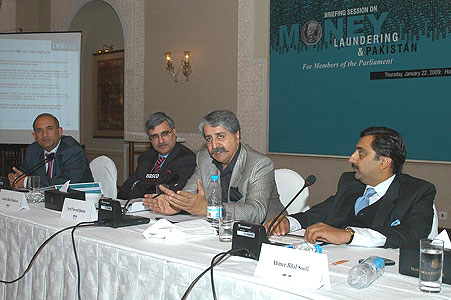
|
|
| |
|
|
| |
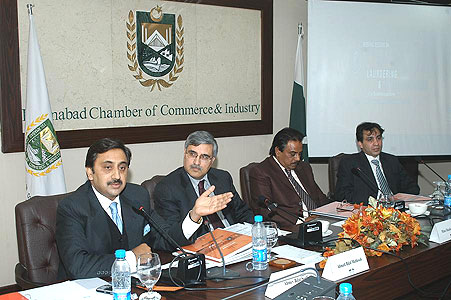
|
|
| |
|
|
| |
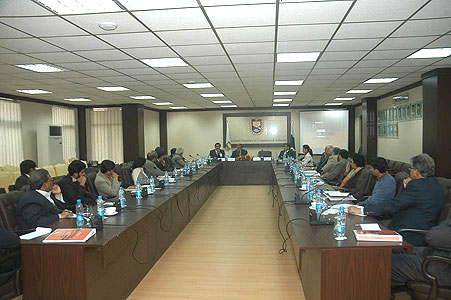
|
|
| |
|
|
| |
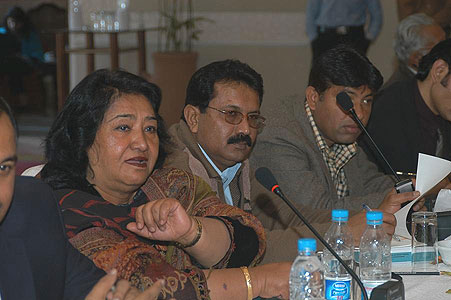
|
|
| |
|
|
| |
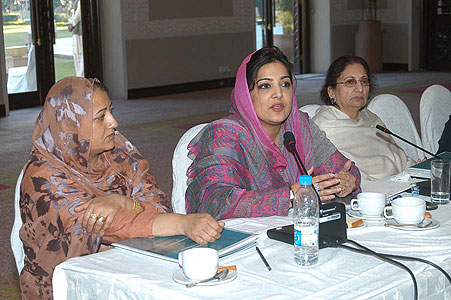
|
|
|
|
|
|
|
|
|